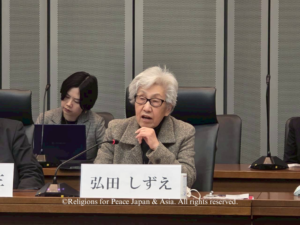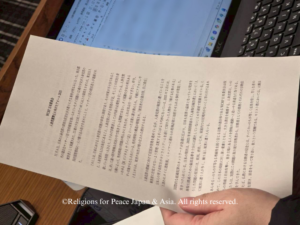[Report] Roundtable for Human Dignity 2025 (written by ACRP Secretariat)
On November 19, Religions for Peace (RfP) Japan held Roundtable for Human Dignity 2025, which theme as “The Current Reality and Challenges of Human Trafficking in Japan – Perspectives from Politics, Media, Labor, Mainstream Newspapers, and Religion”, inviting frontline experts and religious representatives engaged in anti-trafficking work.
■ Keynote Addresses Ms. Hanako Jimi, Liberal Democratic Party, House of Councillors Member, has been standing at the forefront of medical practice, constantly interacting with children and their parents on the front lines as a pediatrician. She said that today’s topic—human trafficking—is closely tied to problems in the Technical Intern Training Program, such as restrictions on changing workplaces and bans on bringing family members, which undermine workers’ rights. She noted that growing momentum within the LDP led to the passage of the Human Resource Development and Employment Act on June 14, 2024, which will take effect in April 2027 and allow workers to transfer employers based on their own wishes. She added that before implementation, she hopes to hear opinions on practical operational issues. The government will also set stricter criteria to prevent exploitation by sending and receiving organizations. She emphasized that countries that fail to protect workers’ rights are increasingly avoided worldwide, and the ILO is urging improvements. Japan, she said, must ensure fair wages and an environment where workers can find meaning in their jobs.
Ms. Hanako Jimi, Liberal Democratic Party, House of Councillors Member, has been standing at the forefront of medical practice, constantly interacting with children and their parents on the front lines as a pediatrician. She said that today’s topic—human trafficking—is closely tied to problems in the Technical Intern Training Program, such as restrictions on changing workplaces and bans on bringing family members, which undermine workers’ rights. She noted that growing momentum within the LDP led to the passage of the Human Resource Development and Employment Act on June 14, 2024, which will take effect in April 2027 and allow workers to transfer employers based on their own wishes. She added that before implementation, she hopes to hear opinions on practical operational issues. The government will also set stricter criteria to prevent exploitation by sending and receiving organizations. She emphasized that countries that fail to protect workers’ rights are increasingly avoided worldwide, and the ILO is urging improvements. Japan, she said, must ensure fair wages and an environment where workers can find meaning in their jobs.
 Mr. Hiroyuki Moriyama, Constitutional Democratic Party, House of Representatives Member, joined via video due to a Cabinet Committee session. He said that Japan still lacks a shared societal understanding of the importance of prohibiting human trafficking, as seen in the widely reported case of the 12-year-old Thai girl. Japan continues to receive repeated UN recommendations on human rights, and its U.S. rating remains low. Although conditions under the Technical Intern Training Program have improved, enforcement is still insufficient. He added that Japan’s legal framework on organ trafficking needs reform, considering both buyers and sellers. He has worked on legislation against the sale of non-consensually filmed adult videos and malicious host clubs, but offenders still exploit loopholes. He emphasized the need to maintain strict enforcement, build shared awareness across society, and continue pursuing legal reforms.
Mr. Hiroyuki Moriyama, Constitutional Democratic Party, House of Representatives Member, joined via video due to a Cabinet Committee session. He said that Japan still lacks a shared societal understanding of the importance of prohibiting human trafficking, as seen in the widely reported case of the 12-year-old Thai girl. Japan continues to receive repeated UN recommendations on human rights, and its U.S. rating remains low. Although conditions under the Technical Intern Training Program have improved, enforcement is still insufficient. He added that Japan’s legal framework on organ trafficking needs reform, considering both buyers and sellers. He has worked on legislation against the sale of non-consensually filmed adult videos and malicious host clubs, but offenders still exploit loopholes. He emphasized the need to maintain strict enforcement, build shared awareness across society, and continue pursuing legal reforms.
 Mr. Hajime Suzuki, as a staff member of the Sapporo Regional Labor Union, handles labor consultations regarding unfair dismissals and unpaid wages, and in recent years has also been responding to consultations from foreign workers. One example involved cases where foreign workers were dismissed during the year-end and New Year holidays. They had been living in the warehouse of a transport company. They were placed in a harsh environment with no insulation and infested with rats. He conducts study sessions on workers’ rights, including solutions utilizing the right to organize (which has coercive power). He spoke about having provided emergency consultations for foreigners.
Mr. Hajime Suzuki, as a staff member of the Sapporo Regional Labor Union, handles labor consultations regarding unfair dismissals and unpaid wages, and in recent years has also been responding to consultations from foreign workers. One example involved cases where foreign workers were dismissed during the year-end and New Year holidays. They had been living in the warehouse of a transport company. They were placed in a harsh environment with no insulation and infested with rats. He conducts study sessions on workers’ rights, including solutions utilizing the right to organize (which has coercive power). He spoke about having provided emergency consultations for foreigners.
 Mr. Jun Hori, who launched the citizen news site “8bitNews,” emphasized the importance of going to the scene based on his belief that “small subjects are more valuable than large ones.” He introduced reports from his colleagues who went undercover in the Mekong region. He also stated that civil society seeks information, adding, “When subjects become large, division begins,” and “Large subjects lead to prejudice and misunderstanding.”
Mr. Jun Hori, who launched the citizen news site “8bitNews,” emphasized the importance of going to the scene based on his belief that “small subjects are more valuable than large ones.” He introduced reports from his colleagues who went undercover in the Mekong region. He also stated that civil society seeks information, adding, “When subjects become large, division begins,” and “Large subjects lead to prejudice and misunderstanding.”
Moderated by Mr. Hori, the session called “Religious Leaders Responding to Human Trafficking” highlighted the realities faced by victims and examined the roles that religious communities must fulfill.
■ RfP Japan’s Initiatives Sister Shizue Hirota (Chairperson of Talitha Kum Japan)
Sister Shizue Hirota (Chairperson of Talitha Kum Japan)
Sr. Hirota introduced RfP Japan’s efforts to combat human trafficking. Japan is a country that produces both victims and perpetrators. A task force was established within RfP Japan due to heightened awareness of the issue. She explained their activities, including delivering a statement to the Japanese government, holding prayer gatherings for preventing human trafficking, conducting repeated public study sessions, and engaging in dialogue with technical intern trainees and their supporters. Lastly, she stated they will continue their dedicated activities to eradicate this problem.
■ Religious Leaders Responding to Human Trafficking (Reports from the Field) Ms. Jihou Yoshimizu (Nippon-Vietnam Tomoiki Support Association)
Ms. Jihou Yoshimizu (Nippon-Vietnam Tomoiki Support Association)
Consultation cases continue to increase among technical intern trainees and other foreign workers who fall through gaps in social systems. Insufficient Japanese-language ability, limited understanding of Japanese regulations, and a lack of accessible consultation services often result in risks such as disappearance or involvement in crime. She emphasized that religious leaders are in a position to hear the voices of vulnerable individuals and bring their concerns to society. Support networks, community engagement, and emotional care are indispensable, and she noted: “Lives can be saved simply by reaching out.” Ms. Motoko Yamagishi (Member, Catholic Commission of Japan for Migrants, Refugees and People on the Move)
Ms. Motoko Yamagishi (Member, Catholic Commission of Japan for Migrants, Refugees and People on the Move)
She introduced the Catholic Church’s efforts against human trafficking and its network-based advocacy activities. In Asia, labor exploitation, child marriage, and human trafficking remain critical issues, driven by migration and widening economic disparities. Talitha Kum Japan organizes awareness events that attract over 300 participants and operates a hotline for technical intern trainees, connecting callers to emergency funds and shelters. However, the Japanese government recognized only 66 trafficking victims last year, revealing severe limitations in the current protection system. Mr. Haroon Qureshi (Secretary General of Masjid Otsuka)
Mr. Haroon Qureshi (Secretary General of Masjid Otsuka)
Japan’s Muslim population now exceeds 420,000, and more than 200 mosques serve as both places of worship and community support hubs. Mosques have provided meals during disasters, supported the homeless, and organized fundraising for crises in Afghanistan, Sri Lanka, Syria, Yemen, and beyond.
At the same time, issues remain: poor working conditions for some technical trainees, extremely low refugee recognition rates, and the absence of adequate support, which often forces people into homelessness or illegal employment. He also raised the sensitive but important issue of burial options, noting that many—Muslim and non-Muslim alike—seek access to facilities that allow earth burial.
■ Why Has the Problem Not Been Solved?
Sister Hirota emphasized that religious leaders are closely connected with people who suffer, yet societal values rooted in materialism and individualism hinder progress.
Mr. Suzuki highlighted systemic problems within the technical trainee program, including exploitative costs paid to sending organizations—amounting to “a form of human trafficking.”
Rev. Dr. Yoshinori Shinohara (Secretary General of RfP Asia and Japan) pointed to the low level of awareness in Japan, recalling a past visit to a shelter where a Filipino religious worker told that “Japan is a perpetrator in this problem,” which sharply highlighted the issue. He stressed the importance of understanding global realities and noted that, in an age where people rely on the internet or social media, religious workers must foster deeper mutual understanding and stronger networks.
Speakers also discussed rising anti-foreigner sentiment, inadequate legal frameworks, and the need to foster trust and dialogue within society.
■ Proposals and Future Cooperation
Participants offered concrete recommendations:
- Strengthen protection systems and support young social workers (Yoshimizu)
- Establish a victim protection law and expand national–religious–civil society networks (Yamagishi)
- Continue human rights advocacy against growing exclusionism (Suzuki)
- Encourage responsible media reporting to avoid reinforcing prejudice, especially toward Muslims (Qureshi)
- Enhance access to information on legal rights and services for foreign residents (Nakamura)
At the end of the session, Mr. Hori stated, “I will not tolerate division,” but those words were directed at himself. He wants to prevent turning away, disengagement, or ignorance from leading to isolation, exclusion, and rejection. To achieve this, he emphasized that it is crucial not to fear communication.
■ Adoption of the “2025 Appeal for the Prohibition of Human Trafficking”
Participants unanimously endorsed and adopted the RfP Japan’s “2025 Appeal for the Prohibition of Human Trafficking.”
>>>Appeal for Action Against Human Trafficking (PDF)
Rev. Fumio Shishino, Director of Taskforce on Prohibition of Human Trafficking, stated in his closing remarks, “Japan often turns a blind eye to inconvenient truths or pretends not to know. Human trafficking has existed in Japan since the Heian period. International human rights issues include labor, sex, and organ trafficking. It is crucial to open our eyes and confront these realities. I believe this marks a turning point in how we will pass this legacy on to future generations.”
The discussion reaffirmed that the shared values and cooperation of religious communities are essential for eliminating human trafficking and realizing a society that respects human dignity.
As secretariat of RfP Aisa, we remain committed to further strengthening collaboration across Asia to address this urgent issue.
